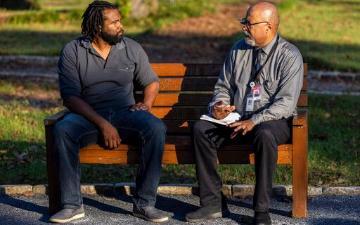Leo E. Strine Jr., chief justice of the Delaware Supreme Court, reflects on how his exposure to Christian, and specifically Catholic, teaching, morals, and ethics influences his view of his judicial and public policy role in addressing the difficult subject of criminal justice.
Criminal justice and the Catholic conscience
Chief Justice Strine, of the Delaware Supreme Court, was on campus this week as the Markkula Center for Applied Ethics’ Distinguished Visiting Scholar.
Strine is perhaps the most influential jurist in all of corporate law and now is the presiding judge of Delaware’s highest court.
Chief Justine Strine delivered a speech on Monday titled “Criminal Justice and (A) Catholic Conscience.” With faculty, students, and community members in attendance, Strine discussed how his Catholic upbringing informs his thinking on criminal justice and shapes his court decisions. It will be published in the SCU’s Law Review.
Strine also addressed the Ethics Center’s Business Ethics Partnership, an ethics and compliance forum for Silicon Valley companies. With Strine, professionals from Flex, Seagate, and other companies discussed corporate law, culture, and ethics.
In an event cohosted by the Ethics Center and the SCU School of Law, Chief Justice Strine engaged in dialogue with 8 leading law firms on the future of corporate law in Delaware. Over 50 attorneys from Wilson Sonsini, DLA Piper, Skadden, and other top firms were in attendance.
Each year, the Ethics Center hosts an influential jurist or official from Delaware, the nation’s leading state for corporate law, to engage in dialogue with the campus and business community. Past Scholars include the Chancellor of the Court of Chancery and the Governor of Delaware.



